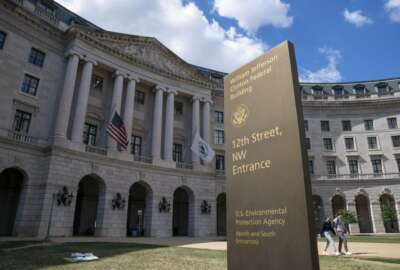

What does the oil and gas industry have in common with the Capitol Hill Police? Both need a bit more oversight from Congress, according to POGO's Tim Stretton.
Best listening experience is on Chrome, Firefox or Safari. Subscribe to Federal Drive’s daily audio interviews on Apple Podcasts or PodcastOne.
What do the oil and gas industry and the Capitol Hill Police have in common? Both need a bit more oversight from Congress, according to Project on Government Oversight Policy analyst Tim Stretton. He joined Federal Drive with Tom Temin with a two-for-one set of recommendations.
Interview transcript:
Tom Temin: Tim, good to have you back.
Tim Stretton: Good to be with you again.
Tom Temin: And let’s talk about the Bureau of Ocean Energy Management part of the Interior Department. That has been an agency in somewhat, I guess, not so much turmoil, but has been a lot of reform of it over the past 10 years or so. And now you have testified in behalf of a bill that would reform a lot of the whole oil and gas leasing. What is it that interior and BOEM especially have to do differently?
Tim Stretton: With the Bureau of Ocean Energy Management, there’s a lot of things that they could be doing that would result in more royalties being brought in to the federal government. As it is now there’s many procedures that they do that allows for oil and gas companies drilling off the coast to not pay their fair share for resources extracted that belong to the American taxpayer. Specifically, one of the things that they’ve done that the Government Accountability Office has even pointed out, is continuously retroactively lowering their valuations of lands that they lease. I think about 90% of the time, when they’ve denied a low bid from a company, those companies came back in submitted higher bids. So in layman’s terms, that just goes to show that these companies are intentionally low-balling the federal government – that leaves billions of dollars on the table.
Tom Temin: Maybe the question is, is there some objective measure that everyone should be using to understand the value of a given parcel that is applied for drilling and mining?
Tim Stretton: Well, I think based on the fact that when 90% of the time when they do reject a bid, the company comes back and submits a higher bid, I think it goes to show that the big valuations are probably actually accurate. The companies recognize that this is a valuable lease, they just try to pay as little as they can. But government has a fiduciary duty to the taxpayer to make sure that they are collecting a fair market value. And as of now, they are not.
Tom Temin: Well would a better system be say just to pay a certain amount of dollars or pennies, whatever the case might be per unit of oil or gas that’s extracted, – that way, it doesn’t matter, you don’t worry about lease values, you just worry about the value of the extracted materials. It could be two cents on a cubic meter, one cent on the barrel, I’m just making up those numbers. But that kind of basis, instead of some leasing basis, which is, as you say, very subject to a lot of vagaries.
Tim Stretton: So how the leasing works is they do pay a royalty for the amount of resources they actually extract. So I think for offshore, it’s around 18.75%, which is actually a pretty good rate, that’s actually increased over the years. But there is also a bid rate as well, and a rental rate. And it’s those that are actually a good amount, but when it comes for the actual leasing, it’s just not being done properly. And I think more transparency on when the government does retroactively lower a lease value. I mean, sure, there’s times where maybe they did overvalue it, but if they do, in fact, retroactively lower it, there should be some kind of public notice there.
Tom Temin: And you say also, in your recommendations that you would require the Bureau of Ocean Energy Management to use a third party to examine the Bureau’s delayed valuation system. Tell us more about that one.
Tim Stretton: What’s really interesting about this is there’s obviously sometimes reasons why the agency may not want to actually go ahead with a lease sale, maybe they want to wait till the next time there’s a lease. However, when doing that, the amount of resources in that particular track may actually decrease over time if another nearby well is actually draining those resources. However, since I think 2017, the amount of leases have actually doubled, instead of once a year, then every six months, and since that the actual delete value has actually increased over time, which even the GAO again has said doesn’t make sense. Given the value of oil always increasing in the number of leases increasing by double, the delayed value shouldn’t increase – in fact, they should actually decrease. So when the Bureau is going through with these delayed value leases, they really should make sure that they’re being done properly. And that’s why we think a third party would actually help make sure that they’re fair, and everybody’s paying a fair rate.
Tom Temin: And who might a third party be? Is there any organization that has that capability?
Tim Stretton: I’m sure there’s several out there. I don’t want to identify any one or another. But I think this is where the government could easily contract with a third party – and I’m sure there’s plenty out there.
Tom Temin: We’re speaking with Tim Stretton policy analyst at the Project on Government Oversight. And let’s turn our attention to another place where you testified recently and that has to do with the Capitol Hill Police, very much in the news, and especially its Office of Inspector General seems to operate quite secretly. What did you find there?
Tim Stretton: POGO, we are big supporters of inspectors general’s offices, they do important oversight work -help identify and root out waste, fraud and abuse in the federal government. However, most of these agencies publish all their reports online in a publicly available way, you can see the reports the recommendations. However, one agency that does not is the Capitol Police Office of Inspector General. And I think now more than ever given with the insurrection that took place earlier this year at the Capitol, the Capitol Police OIG is definitely in the forefront right now of doing their investigation to identify what went wrong and what security failures there were. However, their report, like other reports that they’ve done, are not public. They are a member of legislative branch, and they are exempt from FOIA and certain transparency laws. And I think that’s really unfortunate, given the huge security failure that we saw this year. And the Capitol Police, it has told POGO that they can’t publicly release its own reports, because the Capitol Police board has issued a directive prohibiting the release of these reports. And we think that shouldn’t be the case. First of all, IGs should be independent of their agencies. And the Capitol Police IG itself on their website claims that they are an independent agency. But if they’re taking directives from the Capitol Police board about not making their things transparent, that inherently makes them not an independent agency. So I think this is where Congress really has a role here to prohibit the board from issuing this directive. And last year, the Legislative Branch Appropriations Committee in the House did passing a directive in their appropriations bill, encouraging the Capitol Police board to make everything public to the extent possible. There are certain restrictions for a security and national security – but until this directive from the Capitol Police board is revoked, unfortunately we’re not going to see any of these public reports. And while we did get a small glimpse a few months ago, when the Capitol Police OIG testified, those small flash reports are only made possible through the release from the congressional committees and they weren’t actually released by the OIG themselves.
Tom Temin: Just a quick, detail question. The board consists of the Architect of the Capitol, and the two Sergeants at Arms for the House and Senate.
Tim Stretton: Yes, and I believe the police chief as well.
Tom Temin: Got it. It’s kind of interesting, the police chief being able to tell the inspector general what to publish and not to publish, seems like a inherent conflict. But do members of Congress get to see those reports, otherwise who does see them?
Tim Stretton: They were definitely given to the congressional committee during the hearing. Certain members of Congress should have access to these, but this wasn’t just an attack on Congress on January 6, this was attack on American democracy. And the American people should have a right to see these reports. So as more of these reports are released, these series of flash reports, we hope the Capitol IG is transparent and is able to post these on their website, as well as the depository on the Council of Inspectors General, they have a depository of all OIG reports. We hope they follow agency practices and publish them there as well. Just a note on security though, even the Department of Defense will oftentimes post redacted classified reports, at least that they exist so people can FOIA them. And even other congressional IGs, like the Government Accountability Office, they also actually produce their reports in a publicly available way.
Tom Temin: Yeah, they have a great operation to get them out there. It’s really a great reading. And yes, we’ve seen a lot of those redacted reports from IGs, but like you say, at least something’s going on, even though the black lines often outweigh the text that you can read in there. So in order for the IG of the Capitol Hill Police to start releasing reports, that would take congressional action then to tell the board to tell the IG it’s okay to publish these things.
Tim Stretton: Unfortunately, most likely will have to take congressional action, but the board themselves could rescind this order today if they wanted to. Until that happens, though, I think we have to look to Congress to step up here and make that decision.
Tom Temin: Tim Stretton as policy analyst at the Project on Government Oversight. Thanks so much.
Tim Stretton: Thank you, good talking to you.
Copyright © 2025 Federal News Network. All rights reserved. This website is not intended for users located within the European Economic Area.
Tom Temin is host of the Federal Drive and has been providing insight on federal technology and management issues for more than 30 years.
Follow @tteminWFED


